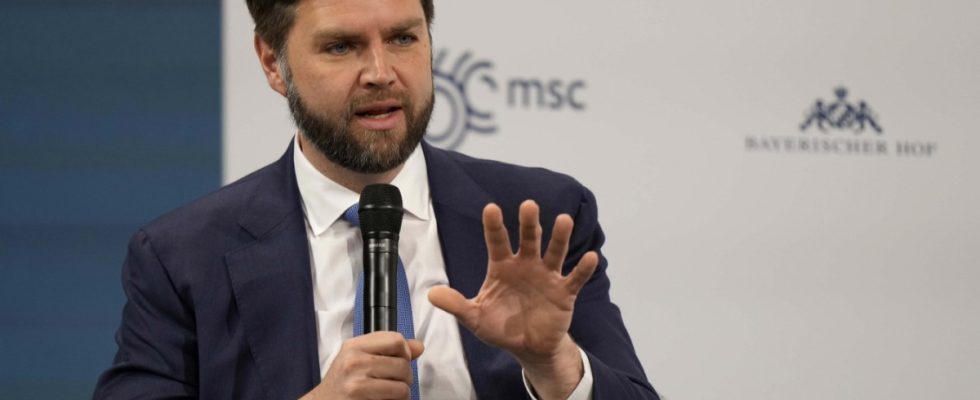Pete Ricketts has not yet been one of the US representatives who almost all participants at the Munich Security Conference know. This is also because the Republican has only represented Nebraska in the Senate since 2023 and is traveling for the second time. But Ricketts’ appearance in a panel discussion on Saturday morning will be remembered.
In response to Ukrainian MP Oleksiy Honcharenko’s appeal that Congress should quickly decide on military aid for Kiev “because otherwise more people would die every day,” the multimillionaire replied: “I understand your frustration, your country is under attack, there are 300,000 Russian soldiers there on your territory. But you must understand that the millions of people coming to the United States illegally are a pressing concern for us.” Boos can be heard from the audience. Ricketts’ insertion – “Of course it’s not exactly the same” – is just as unconvincing as his point that the democratic process is “chaotic” and that the next aid package for Ukraine has already been approved.
Always palpable: the fear of Trump’s second term in office
A defining conflict of this conference can be seen on stage here: the growing concern in Europe that Donald Trump will return to the White House at the beginning of 2025 and damage the transatlantic relationship. The absence of regular Lindsey Graham proves how times have changed. The Republican led the Senate delegation in 2023, and a year later he preferred to fly to Texas to call on US President Joe Biden in the border town of Eagle Pass: “If you, like me, want to help Ukraine, help America first.”
The fact that Republicans are linking the closure of the US border with Mexico to the $60 billion military aid for Kiev fundamentally does not make sense to Europeans – and many of them are stunned that the Republicans overturned the negotiated compromise package in the Senate at Trump’s behest. Sitting next to Ricketts is Estonia’s Prime Minister Kaja Kallas, whose country spends three percent of its economic output on defense. She says coolly: “Six percent of our population are now refugees from Ukraine. If applied to the USA, this would be more than 20 million. I think you will survive the current situation.”
What is undisputed in all discussions is that the Europeans have to invest a lot more money in their armies and produce significantly more ammunition and military equipment. “We shouldn’t do this because of Trump, but because it’s in our interest,” says Dutchman Mark Rutte, who is tipped to be the next NATO Secretary General.
The US representative for reconstruction in Ukraine, Penny Pritzker, describes the 50 billion euro package decided by the EU as “extremely helpful and important”. It is “important to show the people of America that they are not the only ones doing something,” says the Democrat South German newspaper. Support for Kiev is in America’s own interest: “Every day that Ukraine fights for its freedom, it fights not only for its security, but also for our security.”
Suddenly many people are talking about a procedural rule from 1931
The Republicans in the House of Representatives are particularly in focus because, unlike the Senate, there has not yet been a vote on military aid. And because Mike Johnson owes his position as Speaker to Donald Trump, he has so far refused to put the Senate bill on the agenda. It is therefore important to convince them, and that is why, in addition to Chancellor Olaf Scholz, Volodimir Zelensky is also meeting with the MPs. The Ukrainian president explained the military situation with maps and appeared surprisingly “thoughtful and positive”, That’s what US politicians say afterwards. Republicans like Mike Turner have also assured that the aid package will pass.
This is where a term comes into play that hardly anyone knew a few days ago and that is suddenly being discussed in Munich. It’s about the “discharge petition”, a procedural rule from 1931. It is the only way to pass a law against the speaker’s resistance. To do this, however, 218 of the 435 MPs have to sign a corresponding petition. Whether this will work or even be attempted will not be known until February 28th at the earliest, when MPs return to Washington.
On Sunday, JD Vance, one of Trump’s biggest supporters, spoke out. “Of course we love our NATO allies,” said the senator from Ohio to the dpa news agency, assuring that they could count on US support in the event of an attack, even under President Trump. He finds clear words for the hosts: “If Germany has the fifth largest gross domestic product in the world and Russia is not even one of the ten largest countries, shouldn’t Germany be able to guarantee an effective deterrent on its own?”
Later, Vance sits on stage next to Green Party leader Ricarda Lang and disturbs the audience. He doesn’t see Putin as an “existential threat” to Europe – and if that was really the case, then the Europeans would arm themselves more. One has to honestly say that the West cannot produce as much ammunition and material as Ukraine needs to defeat Russia. From this he concludes: “Some kind of negotiated peace is a realistic goal.” Ricarda Lang’s reaction comes immediately: Putin doesn’t want peace. There is therefore no alternative to continuing to support Ukraine with weapons.
Editor’s note: An earlier version of this article stated that Pete Ricketts represents the state of Kansas in the U.S. Senate. In fact, he represents neighboring Nebraska.

